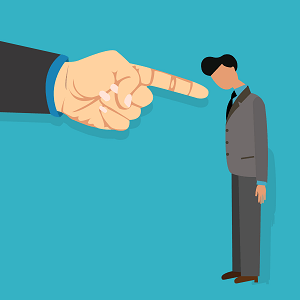Great blog about the personal challenges and insecurities associated with sharing the reality of a diagnosed mental illness with your friends and colleagues. Hattie Gladwell discusses how writing helped her overcome these challenges and allowed her to be true to herself and those she is closest with. Read her blog here.
How Writing About my Mental Illness Helped Me Come to Terms With It
Did Law School Bullying Contribute to a Recent Graduate’s Suicide?
The newest installment of The Struggle, a series of blogs examining the many challenges students face at law school, this sad story is a stark demonstration of the corrosive effects of stereotypes and stigma as two middle-aged, single mothers seek to navigate the rigors of law school in the midst of those who dismiss them because of their sex. Read it here.
Suicidal Law Students Are No Laughing Matter
The latest installment of The Struggle, a series examining some of the mental health issues students encounter at Law School. Read it here.
Depression Dominates Legal Industry, Starting at Law School
The Dave Nee Foundation reports that an average amount of students enter law school with depression, around 8-9 percent, but upon graduation, around 40 percent of law students will have depression. The leading cause of disability in the world and in the U.S. is depression. Some call depression an “epidemic,” which could very likely be accurate in the legal world. Read the full article here.
Lets Stop Assuming People Know What Mental Health Is
One of the most important steps in overcoming the stigma surrounding mental illness lies in concretely defining terms that can serve as the basis for an honest discussion. Ross Szabo, CEO of the Human Power Project, helps clear up some common misconceptions shrouding mental well being in his blog that coincides with the beginning of National Suicide Prevention Month. Read his blog here.
My Struggle With Bipolar Depression and Dream to Go to Law School
I’ve struggled to write this blog, just like I’ve struggled to do most things for what amounts to a very long time now-so long that it feels like a lifetime and what came before only fragments of a not well remembered dream. In actual temporal time, it’s only a few years of melancholy and moderately severe major depression. But in the life of the mind, there is an unbridgeable chasm between the person I am now, who I once was, and who I want to become. I am so lost in my isolation that my only refuge is in turning inward; a strategy which offers no solace at all-only shame and regret.
I feel so isolated. I suppose that is one of the hallmarks of mental illness – detachment – that it seems impossible to relate to anyone. Furthermore, I’m not an attorney, just someone who has lived the hells and wonderful peaks of manic depression. My exposure to the law is through my father, my uncles, my cousins, and Dan Lukasik. I hope to go to law school one day, but I need to retake the LSAT first. So why write a blog? What good could it possibly do? Hopefully, some of the sentiments I describe will resonate with you. But hope is fickle; a thinly stitched veneer stretched tautly over an ever-widening mire of unfulfilled promise. When I look back at what I hoped for, most of it has faded into the mists of time with barely even the trace of memory or, worse yet, has been completely buried beneath the scars of regret.
In the face of my futility, my stupidity, my selfishness, my demons, hope that I can one day return the love and support that has been given me has allowed me to trudge on, kept me from giving up. Even if it flies in the face of all rational thinking, experience, and who you believe you are the sole advice I would deign to give is to no never give up hope that you can bring yourself to a better place and can make yourself into the person you wish to become. Though there be no reason to believe, allow belief to inspire you all the same.
“I can only stand apart and sympathize/ For we are always what our situations hand us/ It’s either sadness or euphoria.”
The above is a stanza from Billy Joel’s song “Summer, Highland Falls” that has always resonated with me. The song itself captures the sense of helplessness, at times even ironic apathy, I have felt towards a disease (or mental illness or whatever I should call it) that has allowed me to leap through the heights of “euphoria”, and to spiral down into the depths of suicidal depression, seemingly completely independent of any of the external aspects of my life.
I once told a friend that in the past three months I had had at least 45 “perfect days” (i.e., days that I could not imagine being any happier in), but that 45 was a conservative estimate and it was probably more. I’ve also spent weeks on end consumed by vivid images of ways in which I could gruesomely kill myself. And both of these emotions, which at the time feel so pervasive and all encompassing, occurred while living on the same college campus and surrounded by many of the same people. So it’s hard not to “stand apart and sympathize” with the fact that regardless of daily accomplishments or minor setbacks, or even in the face of significant change, it doesn’t matter what you do. That because of who you are, in a very intimate and fundamental sense, you are going to experience “either sadness or euphoria,” and you have little say in how intensely you are going to experience that emotion, or for how long (so let’s hope its euphoria, and it lasts forever).
This complete lack of control has always weighed on me as a moral failure because I’ve recognized what I consider the best version of myself-productive, engaged, intelligent, charming and yet, due to an inherent weakness, have been unable to maintain that persona consistently.
Instead I, and I would like to emphasize the contradiction and confusion surrounding a feeling at once of helplessness and simultaneously of complete responsibility for being who I am, have eventually always succumbed to periodic bouts of anxiety, negativity, and self-doubt. These periods have always been characterized by an intense sense of isolation in which almost palpable barriers are restricting me from coming into touch with the people and events surrounding me while at the same time engaging/suppressing the most endearing aspects of who I would hope to be as a person.
There are two types of sadness which result from this frustration and alienation.
Painful Sadness
There is a horrible, painful sadness. For me, this type of sadness is expressed through intense suicidal ideation-constant mental images meant to shock the senses into an acknowledgment of how base you are. Brutal beatings, stabbings, gouging’s, hangings. It consumes you until the idea is all there is and it takes every ounce of energy you have to beat it back. And it breaks your heart to see someone you love not to be able to say that this is how you feel, and it’s not their fault, but you are worlds away and mired in a sadness/loathing that is impossible to understand for those who have not yet experienced it. And they love you, so they are trying to understand, but, how could they? And this breaks your heart even more.
Cleansing Sadness
And there is also a beautiful, cleansing sadness. For me, this beautiful sadness feels more real than anything in the world. When I have been at the height of mania-during the happiest times of my life, I have still felt intimately in tune with songs that deal with regret-juxtaposing the inadequacy of the self with the intrinsic sublimity of some other-which you have failed.
There is a powerlessness to this beautiful sadness, an inevitability. It is real because it exists at the core of our most vulnerable selves, and therefore its expression comes out at a time when we are “most alive” and most in tune with our emotional intuition-when we are most ready to admit to and grasp on to that which we truly hope for and believe in. This sadness is not manifested in horrifying suicidal ideations but rather in the awe-inspiring idea that we are not worthy of the wonderful phenomena we call life. That we are ashamed of our ugliness amidst so much beauty and yet, in spite of our baseness, we have the opportunity to exist within as well as work towards some greater good.
Mania
In many senses, for me, the mania of bipolar has been synonymous with stripping away the debilitating fear and anxiety which were so constricting for so long, and a constant struggle has been not to glorify it. My Mom is taking a wonderful self-help course entitled “Fearless Living” and those two words, again from my experience, imbibe what it means to be manic or hypo manic; imbued with amazing amounts of self-confidence and gratitude, it’s unbelievably easy to live a carefree, upbeat, happy-go-lucky lifestyle, all the while being extraordinarily productive. Thus thinking in the binary can be dangerous-there is a natural tendency to see every aspect of the mania as better than every aspect of the depression.
However, beyond the fact that I have never been able to sustain mania, there is also a depth of feeling engendered by the sincere melancholy of depression that I have never encountered in the euphoric whirlwinds of mania. And I think the small silver lining to what is a dark cloud is the depth of meaning such great sorrow can expose you to-in a way an almost redemptive suffering. At the very least, though depression has taught me to hate myself many times over, it has also taught me to love life. The sad beauty of such a self-effacing distinction, to hate your being while loving your existence, is something to be thankful for and, hopefully in time, something to build off of for the future.
I would like to close this blog with what have for me been some solid building blocks for sheltering myself from, coping with, and eventually recovering from depression.
Exercise
When there seems to be nowhere to turn and the prospect of getting through the day seems unbearable, working out and (especially) yoga exercises are blocks of time where you don’t have to interact with other people, can be totally in your head, and when you’re done you feel a little better physically, even if not mentally. Really any small thing that you can do consistently and through which you can mark progress-I’m getting stronger, better endurance, or greater flexibility-is a wonderful way to establish extrinsic markers of success-I’m better at this than I was a few weeks ago, which, in turn, can catalyze good feelings about yourself as a person.
 Think of something you’ve always wanted to do or be good at, and then identify manageable steps that you can take on a consistent basis that gradually takes you towards your goal. Don’t say I need to be as good as someone else or make an arbitrary benchmark-rather say I want to get in better shape relative to how I am right now, so I’m going to run or go to yoga more often. Or I’ve always wanted to know how to tie my flies, shuffle a deck of cards, play an instrument, or speak a foreign language, so I’m going to work on this task a few minutes each day as opposed to watching TV or surfing the web.
Think of something you’ve always wanted to do or be good at, and then identify manageable steps that you can take on a consistent basis that gradually takes you towards your goal. Don’t say I need to be as good as someone else or make an arbitrary benchmark-rather say I want to get in better shape relative to how I am right now, so I’m going to run or go to yoga more often. Or I’ve always wanted to know how to tie my flies, shuffle a deck of cards, play an instrument, or speak a foreign language, so I’m going to work on this task a few minutes each day as opposed to watching TV or surfing the web.
Taking little steps like these that are working towards longer goals, even if you are not aware of any specific professional or extrinsic benefits to achieving those goals, can be inherently rewarding in and of themselves. If you’re better at an activity, any activity, then you were a few weeks ago, that can be one small thing that you feel good about, even as the rest of your world remains shrouded in darkness. It can help motivate you to get through the day, can serve as a spring towards other “productive” behavior, and eventually be something you can hang your hat on. However, it’s important not to beat yourself up after a day in which you failed to take your positive “step”-rather have a little self compassion and say tomorrow is a new day, and it’s not the end of the world, indeed its completely ok, that I wasn’t able to do anything “productive” today.
Finally, reading and writing can be extremely cathartic. Reading great literature can give you an emotional connection to characters, ideas, and feelings during a time when you felt completely isolated and estranged from the outside world. Fiction and non-fiction distract you from the constant stream of negative and self-critical thinking that can paralyze you. And, in a way similar to the steps discussed above, finishing a book you’ve always wanted to read or one on a subject that you’ve wanted to know more about, can generate a (no matter how small) sense of accomplishment that, no matter how insidiously it attempts to, the depression cannot take away.
On the other hand, for me, writing is more of a risk. I can be very critical of myself as a writer-a case in point is this blog which has been taxing at times-and sometimes end up feeling worse after sitting down to write. At other times, writing has been akin to therapy in that it has helped me to sincerely articulate-in the best way I know how the complex matrix of emotions enmeshed within me. Even if journaling or poetry don’t make sense to a single other person, the fact that they make sense to you can temporarily relieve part of the burden imposed by self-guilt and personal shame. It can be an outlet for your anguish, space where you can be authentically yourself. Sometimes, you can be so overwhelmed by your depressive thinking that you need some way to release that thinking-writing can be an effective way to do this.
In any case, don’t immediately sit down and assume that because of your depth of feeling you’re going to write the next great American novel. Rather start with a paragraph or a poem. It might end up being useless junk that you never look at again, and that’s ok, because part of what depression is, is a needless anguish and self-doubt that is inhibiting you in your quest to live a full life and should be discarded as soon as possible. But amidst the uselessness you may stumble upon small snippets of truth-a rhyming couplet here, a few sentences there-that satisfactorily express for you one of the tragic and meaningful aspects of your condition (or symbolically the human condition more generally). These small snippets are worth holding onto as they reflect the deeper truths embedded within a malaise that so often brings us to our knees and which, on sublimely rare occasions, reveals insights that one (I believe) can only obtain through suffering.
Anonymous
Further reading:
Writing Your Way Out of Depression
The Bipolar Disorder Survival Guide: What You and Your Family Need to Know
Yoga for Depression: A Compassionate Guide to Relieve Suffering Through Yoga
The Bipolar II Disorder Workbook: Managing Recurring Depression, Hypomania, and Anxiety
Is Bipolar II Easier to Live With Than Bipolar I
Depression Undercover: A Trial Lawyer’s Secret
Once upon a time, I was a trial attorney at a personal injury defense firm. I was good at it. I always pushed hard; always did the best job possible. I won a good share of cases, and, of course, lost a few as well. I was valued highly enough to be made a partner shortly after joining the firm.
But I had a dirty little secret. I had bipolar disorder, which was well-controlled through a close partnership with a good psychiatrist. Still, in my mind, if word ever got out, my employers would see me as weak, a liability. To a degree, I understood. If the insurance companies that paid the bills learned that one of the firm’s trial attorneys had such a condition, their mandate would be clear: if you want our business, get rid of him. That is what I assumed.
Throughout my career, colleagues would make offhanded remarks about someone “not taking his medication.” I would grit my teeth and ignore it.
Instead, I was able to construct an alter-ego, the “happy warrior.” I had a smile on my face and a sardonic remark ready on cue. But I went about my daily business feeling like a secret agent in a Cold War spy movie. If my cover was ever blown, I was certain that my career would be at an end.
Over time, maintaining this secret identity while dealing with the usual strains of trial practice gave rise to a growing depression. Yet I still performed at a high level and still got results.
Although I had a close friend at the firm, another partner, he would deflect when I tried to talk to him about my depression, so I stopped. I began to worry that others at the firm might know about me.
Fear and the sense of isolation only fed upon themselves in a continuous cycle. I finally experienced a severe episode of depression that led to a period of disability. When I told my boss what was going on, he expressed genuine surprise that I was suffering from depression at all.
When I returned to work, I felt better, but I remained wary. Instead of engaging in a conversation about what had happened, we all acted as though nothing had occurred. The computer was rebooted, and business continued on as usual. I went back undercover, and no one seemed to mind.
Simply due to scheduling conflicts and adjournments, it was some time before I tried another case. I admit that I was a little nervous, but I was having no trouble handling my case load. I was puzzled when my boss came into my office one afternoon as I was preparing for the trial. He asked me if I felt good to go. He had never done that before. I said, “yes,” because I felt perfectly up to the task. I never asked myself, “If he is worried about my performance, why is he even letting me try the case?”
At trial, the insurance company sent an adjuster to audit the proceedings, a routine procedure. I knew him well, and he had an excellent grasp of the case, even though he had not been involved before trial. We had constant discussions about what was going on, and we seemed to be in sync. Suddenly, the insurance company pulled my old friend off the case and replaced him with a mid-level manager who consistently praised my performance.
The case went to verdict, and the jury awarded somewhat less than what the insurance company had offered settle for. To preclude the possibility of an appeal, the insurance company threw in a few more dollars. Case closed, on to the next one. To me, that was a pretty good result.
Was I in for a big surprise.
Shortly after the trial, year-end reviews were scheduled. I was getting ready for another trial, and I was very excited about it, so I wasn’t really paying attention to what was going on in the office. Other attorneys were getting their reviews – important because raises would be discussed – but I was never called in.
Ultimately, my case settled after much hard work on all sides, and the usual time for reviews was long past. I did start to worry then. I even made a remark to my secretary about it.
The call finally came. When I stepped into the conference room and saw every equity partner in the firm waiting for me, I knew. The spy had been caught, but what would happen?
My boss said that they waited to speak with me because they did not want to put pressure on me while I was preparing for another trial. He asked me if I felt capable of trying cases. I paused and then broke under the years of strain. I wept, and answered, “No.” Whether that “No” was true then or true now or was ever true, it was the most humiliating moment of a 20-year career.
My boss started to dissect my prior trial, telling me that the insurance company’s representative was reporting that I was doing a bad job. He even told me that the supervisor at the insurance company knew that I had depression. After the expected awkward silence, another partner suggested that “we find a creative solution” to keep me at the firm. I made some suggestions over the next few months. No replies were forthcoming. I was quietly being swept out the door. It wasn’t hard to get the message. I found another job and moved on.
The whole experience seemed to confirm everything I feared about being a lawyer with depression. Currently, I am not practicing, and am seeking other opportunities.
But if the story ends there, what is the point? Can I offer my account as a teaching opportunity? At the very heart of the tale lies the sad truth that we, as lawyers, trained to be superlative communicators, can utterly fail to make each other understood when it comes to depression. Should I have been more candid about my condition? My employers never told me what concerns they had or what they knew. Could all of us have been proactive for our mutual benefit, especially after I returned to work? I believe that there had been an opportunity to open a constructive dialogue, but my fear told me to keep my mouth shut. I cannot speak for my former employers, although I highly doubt that they held any malice. I doubt that they thought much about it at all until some critical pressure was brought to bear, whether from within or outside of the firm. Unfortunately, by the time everyone was talking, my job at a firm I loved was gone.
I miss working there. I still have close friends there. I see them when I can, which is not often enough. Just recently, I ran into my secretary, and we briefly chatted about my plans for the future. And then she said something that cut me to the quick: “You were a good lawyer.”
— Anonymous guest blog
Other People’s Judgements About Our Depression
We all dish out opinions and advice whether asked for or not.
Much of it harmless; some, necessary and kind.
Then there’s those we dole out without knowing what the hell we’re talking about. Where we should tread carefully, we lumbar.
For better or worse, there’s tremendous power in words we use to express our opinions. When vulnerable – as we are during depression – the critical or misguided words of others take on the ring of gospel truth. Some may blame us for our depression.
In one poll, 54% of Americans said they thought of depression as a “personal or emotional weakness”. This explains much of stigma surrounding not only depression but all mental illness.
In a recent survey, what do 43.8 percent of women state as the Number 1 reason for not telling someone they were depressed?
“Others would think I am weak or think less of me.“
What do 57 percent state as their Number 1 reason?
“I believe I will get over it by myself”, followed by the same reason as women, the fear of being seen as weak, at 32 percent.
In the book, Unholy Ghosts: Writers on Depression, author Susanna Kaysen writes:
“The Failure of Will theory is popular with people who are not depressed. Get out and take your mind off yourself, they say. You’re too self-absorbed. This is just about the stupidest thing you can say to a depressed person, and it is said every day to depressed people all over this country. And if it isn’t that, it’s, shut up and take your Wellbutrin. These attitudes are contradictory. Conquer Your Depression and Everything Can Be Fixed by the Miracle of Science presuppose opposite explanations of the problem. One blames character, the other neurotransmitters. They are often thrown at the sufferer in sequence: Get out and do something, and if that doesn’t work, take pills. Sometimes they’re used simultaneously: You won’t take those pills because you don’t WANT to do anything about your depression, i.e. Failure of Will.”
Some just don’t think of it as the illness it is, but an excuse not to work hard.
Years ago, when I first told my three law partners that I was diagnosed with major depression and would need to take time off from work. They sat there stunned. After a moment of awkward silence, one partner said, “What in the world do you have to be depressed about? You’ve got a great job, wife, family and friends. Take a vacation!”
His anger humiliated me. “What’s wrong with me?” I thought.
I later learned that his reaction was, sadly, all too common. His judgment was that a lack of gratefulness was at the root of my distress. If only I jetted to Florida and sat under a palm counting my blessings, I would be depression-free.
For some time, these types of comments hurt me. They made me feel less-than. But after a while, they often made me angry. I thought, “What the hell do I have to do to be worthy of their mercy?” In retrospect, it wasn’t a question of my worthiness, but their ignorance. They didn’t have an emotional reference point for depression. They thought of it as stress, or, at worst, a bit of burnout. I recall a surgeon friend of mine (you would think that he, as a medically trained person, would know better!) telling me I was just in a “funk.” And then he said, “You want to see people who really have a right to be depressed? You should see the poor people with little money take two bus rides just to get to my office!”
Another painful innuendo. I had no right to be depressed, he must have thought. I was an upper-middle class professional, after all.
Some people (friends, family and business associates) will never be able to overcome the inertia of their own ignorance. They’re not bad people. It’s just the way life is. And we have to learn to be okay with that.
One of my best friends who has struggled with depression the past five years is frustrated by his wife’s lack of interest in talking to him about his depression. “Why doesn’t she love me, Dan?” “It’s not that she doesn’t love you,” I replied. “It might just be that she’s not capable of understanding in the way you want her to.”
But then there are others. These precious souls – and there don’t have to be lots of them – who have our back. They truly want to understand and help. Mother Teresa was once asked by a hard-boiled reporter what God expects of humanity. I think the reporter expected some stock answer. Mother Teresa, in all her gracious dignity, said that all God really wants from us to be is a “loving presence” to one another. There are those in our lives who want to be that presence to us.
Give them the chance to be that light.
The Ups and Downs of a Bipolar Life: An Interview with Tom Roberts
Podcast: Play in new window | Download
Hi, I’m Dan Lukasik from LawyersWithDepression.com.
Today’s guest is Tom Roberts. Tom is a mental health speaker and writer living in Huntington Beach, California. He’s the author of “Escape from Myself: A Manic-Depressive’s Escape to Nowhere” Tom earned his Master’s Degree in Radio, Television, and Film from the University of Kansas. He worked for several years as a broadcast journalist for local stations and freelanced for National Public Radio’s popular newscast “All Things Considered,” “The Voice of America,” and “ABC Radio News.” Tom has been a professional actor on stage, screen, and television and currently does voice-over work in the L.A. area. He is the creator of the website Tom Speaks Out!
The Ten Best-Ever Depression Management Techniques: An Interview with Dr. Margaret Wehrenberg
Podcast: Play in new window | Download
I’m Dan Lukasik from Lawyerswithdepression.com. Today’s guest is Dr. Margaret Wehrenberg. Dr. Wehrenberg is a clinical psychologist in Naperville, Illinois. She is the author of six books on the treatment of anxiety and depression published by W.W. Norton, including, “The Ten Best-Ever Depression Management Techniques: Understanding How Your Brain Makes You Depressed and What You Can Do to Change It” and “Anxiety + Depression: Effective Treatment of the Big Two Co-Occurring Disorders.” An international trainer of mental health professionals, Dr. Wehrenberg coaches people with anxiety via the internet and phone. She’s a frequent contributor to the award-winning magazine, Psychotherapy Networker and she blogs on depression for the magazine Psychology Today.
Dan:
What is the difference between sadness and depression and why do people confuse the two so often?
Dr. Wehrenberg:
Because depression comprises sadness. Sadness is a response to a specific situation in which we usually have some kind of loss. The loss of a self-esteem, a loss of a loved one, the loss of a desired goal. Depression is really more about the energy – whether it’s mental energy or physical energy – to make an effective response. So, sadness is an appropriate and transient emotion, but depression sticks around and affects all of our daily behaviors and interactions.
Dan:
What causes depression? Sadness, as you say, is an appropriate response to loss. What is depression a response to? What are the causes of depression?
Dr. Wehrenberg:
Over the course of my career, I’ve developed the idea that there are four potential causes to depression. This comes from working with people for forty years; it comes from reading a lot of research.
The first part is genetics. You are born with a brain that is going to tend toward depression because of the function of neurotransmitters in your brain. It’s a genetic predisposition towards depression. With poor self-care, poor nutrition, you may end up stimulating or starting that feeling of low energy, of low interest in the world around you. Then if you pull back from the world around you, now you start to have fewer experiences that keep you interested in the world.
Another possible and probable cause is with people who are experiencing situational stress that goes on, and on, and on. That could be the stress of not being able to earn enough money, and you’ve got two jobs, and kids, and a life filled with stress. It could be the stress that comes on while caring for someone in your family circle who’s got a disability, or a chronic illness; that increases with severity over time. So, you’re stuck in stress, and you deplete yourself. And you can become depressed.
The state of the depression is a lot like the state of being sick. If you had the flu, you wouldn’t feel like sitting around eating and drinking; you wouldn’t feel like playing a round of tennis. If somebody says, “Let’s watch a really interesting T.V. show” and you say, “No, I want to go to sleep instead,” that’s pulling back from the world is healing. People have the same feeling when they’re depressed, but those feelings don’t lead toward healing because they’re persistent.
Two other causes that people would certainly be aware of are trauma or coming from early childhood adversity where early in your childhood you were not treated well, you were neglected, had some other abusive situation, and those two very difficult situations can lead people to function in a depressed way.
Dan:
Let’s talk about the issue of stigma. As a person who’s had depression for the past 15 years, it’s something that I’ve had to deal with. Why is there so much stigma surrounding depression?
Dr. Wehrenberg:
Part of it is because we have this mentality in this country that you should be able to pull yourself up by your bootstraps. And we look at people who are low energy, who aren’t completing tasks, and we judge them as doing it on purpose. People who aren’t depressed are of the impression that you could just decide to do it differently.
I was speaking with a 21-year old client of mine the other day who said, “I can’t make myself do the work, and I hate it that I am that lazy.” So, he judges himself as lazy, even though it’s the depression that’s robbing him of energy and mental tenacity. So, even depression sufferers judge themselves to be wrong, lazy, and bad and believe they should do better. So, I think the cultural expectation that you should be more productive. Also, people don’t see it as the medical problem it is. It’s just that it’s not a very “visible” medical problem.
Dan:
In the past 40 years or so that you’ve been a therapist and have treated people with depression, what have you observed about the rate of depression in our country and our understanding of it?
Dr. Wehrenberg:
I think the rate of depression, everybody would agree, is growing. More and more people are suffering depression.
There are different reasons why when we look at this.
Culturally, one of them is that American culture is a highly stressed culture. But it’s stress not over life and death, but that’s certainly the case for many living in poverty who have to worry where their next meal is coming from, but usually, what we look at is the stress of always needing to be more, to do more, to get more status and money. That’s not a very good way to feel good about yourself because there’s a limit, a human limit of time, a limit of money, a limit of talent or ability, a limit to resources or access to achievement.
Dan:
Following up on what you just said earlier, you talked about some possible causes of depression including genetics and family of origin issues. Now you’re talking about American culture and its connection to depression. What is the connection?
Dr. Wehrenberg:
We have a culture that values productivity, money, and status, and not everybody can achieve goals of status or financial success and it gets depressing to see how valuable those seem to be in our country.
We don’t value something everybody can do. Like, be a person of good character. We value how much status you’ve got, which is very different.
Dr. Andrew Weil, who is a real guru of physical health and mental health, says he thinks that stress equals inflammation in your whole body and that inflammation is a trigger for depression.
Dan:
Why did you write the book, “The Ten Best-Ever Depression Management Techniques?” It’s a great read. I recommend all my listeners and readers at lawyerswithdepression.com to pick it up.
Dr. Wehrenberg:
I wrote it because I believe both consumers and therapists need ideas for what to do right now other than to investigate, in some more general way, a life history, what do you do today that will make you feel somewhat better, to start you moving out of the depression. I wanted to present as many practical ideas as I could that would help people start to lift out of depression with the help and advice of a therapist and also for the general public that could read this book and say, “Oh, there are things I can do that would make me feel better.” And they’re simple; they’re not complicated.
Dan:
Can you share with our listeners some of the techniques you recommend in your book?
Dr. Wehrenberg:
Let’s start with somebody with low energy. Almost everybody who is depressed is doing something even while they are depressed. Playing a game on their phone, watching T.V. or watching Netflix. They are doing something. Unless, they are sleeping, of course. But I want to use what you’re already doing to help motivate you to do something you think you should do. So, for example, I often see people with depression that aren’t doing good health care, they’re not doing good care of their environment, they are not doing dishes, they are not doing laundry, stuff like that. So if you just think about household stuff for a second, what I want my clients to do is to break down the task into its parts.
If you’re going to do laundry, the first thing you have to do is pick it up off the floor. So, I don’t want you to think, “Oh, I’ve got to get all the laundry done.” If you’re depressed, that won’t work. What I want you to do is think is, “All I have to do is pick up the dirty clothes in the family room and then I’m going to sit down for 15 minutes and do what I’m willing to do anyway – play a game on the phone, turn on Netflix. Set a timer for 15 minutes of enjoyment of your show and then when the timer goes off, you just get up and pick up the clothes off the floor of your bedroom. Little pieces, okay.
What we know about depression is those small accomplishments are perceived in the brain as positive and encouraging, and you start to feel, “Oh, I can do something for myself.” You begin to have just a little rise in your overall energy. If you can do that consistently, then pretty soon, you get the task of doing the laundry over with. It may take a few days, but it’s done. Then you have a positive self-appraisal. That’s what I’m going for, for example, with a very simple way to think about raising your energy through small increments.
Dan:
So the small steps and small behaviors affect neurochemistry?
Dr. Wehrenberg:
They do, indeed. Because when you take action and it has a positive outcome, you have just changed the level of the neurochemical called dopamine, which I call the “James Brown” of the brain. It’s the “I feel good,” when dopamine is released in your brain you feel better. We know that people who decide, “I am going to do this,” and do it, they get a rise in dopamine and change your neurochemistry.
Dan:
I want to discuss your second book, “Anxiety + Depression: Effective Treatment of the Two Co-Occurring Disorders.” I struggle with both anxiety and depression with depression being the primary diagnosis. Many people I meet struggle with both. Why do the two co-occur together and sometimes not?
Dr. Wehrenberg:
Very often, if you are looking at brain function and structure, what you see in people who have both anxiety and depression, which, by the way, is about fifty-percent of the time, is that people who have one, have the other. Often, the anxiety comes first, and it’s not treated well. There’s a neurochemical called serotonin which is related to something called rumination or you might think of it as “brooding.” When people brood, when they go over and over a failure or fear, they get stuck mentally. It raises anxiety because it’s hard to solve a problem that you’re just brooding about and it raises depression because you don’t feel like you’re moving very much in your behavior or your thinking. That’s a pretty simplistic statement. And people will say, yes, but there are far more theories about the underlying neurochemistry. That’s true, but the chemistry that relates to brooding is related to both anxiety and depression, the repetitive, negative thinking.
Dan:
Regarding your history as a therapist treating people with anxiety and depression, are there some techniques that work better with anxiety versus depression? Or, do all these techniques work equally well with both conditions?
Dr. Wehrenberg:
I think you have to look at the energy level. Some people with anxiety and also depression have a fair amount of energy to cope with the depressive quality of repetitive, negative thinking. And you use the energy of that anxious person to be more assertive with yourself to say, “I’m going to take charge of this.”
But what I also find that works very well with anxiety and depression together is to work on mindful awareness, to try to stay in the moment, not to try to predict a negative outcome, but rather to pull yourself into the moment. And mindfulness, which can be done by meditating to stay in the present moment, but you can also just keep pulling yourself back to this moment by saying to yourself, “What’s happening now?” This pulls you back from predicting negative outcomes and then getting upset about what might happen. If you stay in the now, you can say I can do this activity now, this action now, and all I have to worry about is now. And then you tend to get better outcomes. So, that’s good for both for anxiety and depression.
Anxiety is “I worry about the future; I fret about the past.” And depression includes, “I think the future will be grim.” So if you stay in the moment, you’re addressing both of them.
Dan:
As a psychologist and therapist who’s worked with people with anxiety and depression for decades, tell us a little bit why a person struggling with depression and anxiety should see a psychologist, a therapist? What benefit could be obtained from seeing someone such as yourself and how does that work?
Dr. Wehrenberg:
We know that medication, which is often people’s first choice, can be extremely helpful. But what I say to my clients is that medication can help you feel somewhat better, but it doesn’t teach you anything about managing your life. Psychotherapy, when it’s practical, when I’m looking at it through the “The Ten Best-Ever Depression Management Techniques,” what it’s teaching you is how to handle your negative mood, what to do when you don’t have energy. It’s teaching you behavior that will rewire your brain. It talks about how and why exercise and nutrition are important.
But also why taking even a small action on your behalf changes your neurochemistry. So, psychotherapy immediately affects brain function. But, you usually need a psychotherapist to give you ideas, help you find ideas of how you stop yourself, how you block yourself, and to help you find the most effective tools for you in your specific situation. A psychotherapist can be very helpful in teaching you how to get rid of these negative symptoms and feel better for life.
Dan:
Dr. Wehrenberg, what’s the best way for our listeners and readers to get in contact with you?
Dr. Wehrenberg:
Well, if you’re able to spell my name, you can look me up on Margaretwehrenberg.com. I work in Naperville, Illinois. But my website has my telephone contact and a link. And if you went to the Psychology Today magazine website, you can look at my blog on depression, and you would be able to contact me through there as well. I have a really good “Contact me” on my website.
Dan:
On behalf of your listeners at Lawyerswithdepression.com., I want to take the time to thank you for this insightful interview. I think it’s going to help many people.
Dr. Wehrenberg:
Thank you for having me. I appreciate it.
Built by Staple Creative




















